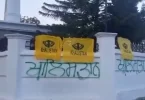“Baby sitters and care givers for old wanted in the Gulf. Attractive pay and perks. Women who have crossed 40 contact.” the poster in Malayalam successfully grabbed the attention of the 43-year-old mother of two in Kochi.
Belonging to an economically weaker background, the woman and her family saw this a way out. Her husband contacted the phone number given on the notice — a travel agent in Kozhikode in north Kerala. The travel agent helped the woman in procuring a passport via express application. The family mortgaged their gold jewellery to meet the expense of air ticket, visa and agent fee totaling at ₹1.20 lakh. Her promised salary was ₹30,000 a month.
She left the country in February, this year for Kuwait. She said that a middle-aged woman from Kerala received her on the airport and took her passport on arrival. On the second day, she realised she was duped as she was forced into sex trade.
“I was told it was just a passing phase,” she said, adding she had no passport and no knowledge of the local language. The woman said that she was forced to tell her kin that she was enjoying her work as a house help.
Unbearable, one day she attempted suicide, however, she was rushed to a hospital and had to spend four days there. Later her tormentors agreed to let her go but not before forcing her to sign a few papers and threatening her to not reveal her travails. Her husband had to cough up ₹50,000 for the return ticket.
After months of ordeal, she returned to India in May penny-less. Presently, she is undergoing treatment in a private hospital in Ernakulam. The old contact no of the local agent is not functional.
In March, another Kottayam-based woman was sold to an Arab household as a slave. She had to spend two months there. “My passport was seized and I was locked in a room with four women. I was assaulted when I tried to get in touch with my family. Later, I was sold to a Kuwait-based family for ₹3.50 lakh. I was forced to work even during night and was given little food and at times even starved,” said the 44-year-old.
She said she along with two other woman escaped after they managed to send their geographical location to volunteers of a social organisation who traced and rescued them. Later, they also sponsored their tickets back home.
“Once, I was forced to stand in blazing sun for not completing my job on time. I was hardly allowed four hours of sleep and had to survive on kubuz (Arabian bread) and water for days together. My life was worse than a slave there,” said another returnee.
Despite strict restrictions, human trafficking to Gulf countries continues unabated. In last two months, 20 such women returned home empty-handed, said police. A senior police officer admitted they have information that hundreds of women were stranded in Gulf Cooperation Council (GCC) countries like Kuwait.
Modus operandi
The modus operandi of traffickers is same, they target economically-distressed families and exploit them. Immigration norms are strict for young women job seekers so they target middle-aged ones, said social workers dealing with such cases.
Police said they have information about two travel agencies, in Kochi and Kozhikode. Kochi police commissioner Nagaraju Chakilam said, “At least 30 women were trafficked from Kochi in last four months, out of which 20 have returned. Local agent K Ajumon has been arrested.” Though police unearthed the Kochi-based racket, kingpin M K Gazali alias Majeed hailing from north Kerala is still at large.Gazali’s passport has been cancelled and a lookout notice has been issued against him, said police.
Denying the charges, Gazali told a Malayalam news channel, Media One, from the Gulf that he was running a “recruitment firm”
“I am running a labour recruitment firm in Kuwait and we get visa for house help only. We are not responsible for what agents do or promises,” he said denying physical torture or sexual exploitation of women. But some of the returned women alleged that “he considered them as mere slaves.”
An intelligence official said he took more than 200 women from the state in two years and his alleged nexus with terror outfits was also under scanner.
“The agents exploit economic condition of gullible people promising greener pastures. But they end up in extreme trouble. Better awareness and strict monitoring back home can help contain the menace,” said an office-bearer of the Kerala Muslim Cultural Centre (KMCC) in Kuwait, Sharafu Chittaripilakkal, who helped five such women in two months.
Some of the victims complained that their tormentors often took the name of some outfits in the Islamic State- controlled areas in Syria and threatened to take them there if they protested or informed their family members.
“After initial inquiry, we found the issue of selling them to ISIS was a threat but detailed investigation is on,” said commissioner Chakilam. Officials of the National Investigation Agency (NIA) also later took their statements.
Another social worker from Dubai, who did not want to be named, said often many young girls come to the island on the pretext of tour and engage themselves in dance bars and paid sex jobs. “We can’t say it is exploitation because they come on their own. But in some cases we have noticed blackmailing and exploitation and later they were also involved in gold and drug smuggling,” he said. A senior immigration official also admitted this. “We have information that many go through Bengaluru and Mumbai airports. We have limitations in this,” he said.
During recent Loka Kerala Sabha — a meeting of non-resident Indians held in the state capital last month — many members from the middle-east asked the state government to take strict measures to contain the scourge. Many eyes turned moist when a former house help Elizabeth Joseph (55) narrated her 31 years of experience in Oman. “I was forced to do work for 20 hours a day and often had to search the waste bin for food. I was still hopeful. I married off my two girls and came back to the country with a host of diseases,” she said.
Stringent provisions
There are stringent provisions to recruit house helps in Gulf countries, including emigration clearance and visas which are channelized through eMigrate website. The sponsor has to provide a bank guarantee of USD 2,850 as security deposit to the embassy. This deposit is used as compensation for unpaid dues and legal obligations. The Department of Non-residents Keralites’ Affairs (Norka) also keeps a watch on spurious recruitments.
“Most of these local agents don’t have license. They use spurious designations like baby sitters, help for aged, garden attendants and cleaning staff to dupe people. Despite stringent provisions and awareness drive, many are still getting into traps,” said a senior police official.
In Kerala, conviction rate in trafficking cases is less than 10% as many perpetrators remain abroad and poor economic conditions force victims not to pursue their cases or they are forced into settlement. Police admit that majority of trafficking incidents don’t even come to light.
“It is sad that in Kerala, a state with 60 years of migration history, women are still duped, trafficked and enslaved. Both countries of origin and destination should adopt right-based bilateral labour agreement to ensure fair and ethical recruitment,” said author and migrant rights activist Rejimon Kuttappan.
In a written reply in Rajya Sabha in February this year, minister of state for home Ajay Mishra said between 2016 and 2020, 525 cases of human trafficking were registered in Kerala and only in three cases accused were convicted. In 2018, 243 people left Indian coast from Munambam (Kochi) on a fishing boat and their whereabouts are still a mystery. Majority of them were from Tamil Nadu and their reported destination was Australia.
“Crores of rupees is being spent to contain trafficking but many women still fall prey. We need strict pre-departure orientation training and model employment contracts,” said Kuttappan.
On July 7, chief minister Pinarayi Vijayan had called a meeting of senior officials and directed them to take stringent action against such fraudulent firms.
“We always encourage safe and quality migration and carry out regular awareness programmes. We have formed a task force comprising officials from police, Norka and other departments to prevent such incidents,” said Norka CEO Harikrishnan Namboodiri







